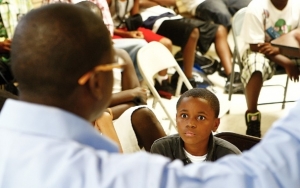What it takes to be a man
By Phyllis Moore
Published in News on July 29, 2010 1:46 PM

News-Argus/MICHAEL BETTS
Tyrek Durham listens closely as Edward Harris Jr. of Everlasting Investments teach a life and career skills lesson to boys at the Boys and Girls Club in Goldsboro. Harris is teaching a six-week program titled Passport to Manhood. The program teaches young men the skills they will need to succeed as adults.
Growing up, Edward Harris Jr. spent many a day at the Boys & Girls Club on Royall Avenue.
Marvin Ford, who has worked at the club for 21 years, 12 of those as unit director, used to caution Harris against hanging around with a bad crowd.
"He'd say, 'I hear you,' but he wasn't listening until he got into trouble," Ford says now.
Selling drugs and serving time in prison took up several years of Harris' life, until he turned things around and started walking a better path.
Now his purpose is to give back to young men who are finding themselves at the same crossroads he once faced.
"I was a drug dealer. I didn't know how to be a father," said Harris, who is now married and father to five children.
In 2006, he became founder and CEO of his own motivational speaking entity, aptly titled "Everlasting Investments."
"Twelve of us are volunteer speakers. We go out to community colleges, churches. The knowledge that we give them, it could be everlasting if they apply it," Harris said. "We come in and we talk to them based on our experience. The majority of the volunteers had a negative time growing up. We're all ministers. We speak to youth and try our best to help them."
Their emphasis is simple -- how to become a good man in a world that doesn't always encourage that type of behavior. From foundational messages that include encouragement to finish school and go on to college, to teaching professionalism -- interview skills, how to tie a tie -- and the importance of treating women with respect, Harris said. He is especially concerned with working in areas where boys are in need of fatherly guidance.
"Our passion is to help the youth not make the wrong decisions that we made," he said.
It was only natural that one of his target areas would be the club where he spent much of his own youth.
He approached Ford recently about leading a program there for boys and young men.
The six-week class, "Passport to Manhood," began last week, with 25 young men in attendance. At its second session, there were nearly 50.
"Last week, I spoke on how to greet a man, speaking to people with respect," Harris said. "I had them introduce themselves and tell me what they want to be 10 years from now."
He said he told the boys that his presentation would not just be lectures.
"I promised that I was not just here to talk, and told them that I will go and do research to tell them what they need to start working on right now (to get started toward a career.)"
Molding young men into solid adults has to start sooner rather than later, Harris emphasized.
Whether it's talking about interviews and resumes or choosing the right friends to hang out with, Harris wants his message to take root.
At Wednesday's session, he shared with the group how there will always be people to accept them. Even when he was selling drugs and eluding the police, he still had acceptance, he said.
"I got a handclap from negative people and I wanted a handclap from positive people, for doing something good," he told the group. "How many want a handclap for making D's? How many want a handclap for making A's?
"We want to teach you all how to be successful in life. How many want to be successful in life? Do you have a problem with us teaching you that?"
Harris' style is praise and encouragement. As each boy prepared to speak, he'd ask the audience to remain quiet, then elicit applause when a good answer was given.
To put them at ease, he cautioned them against laughing at their peers.
"You might be next and say something that's laughable and you wouldn't want anyone to laugh at you, would you?" Harris asked the assemblage.
He set up a mock job interview station, then explained about the importance of shaking hands and making eye contact.
The "real world" scenarios he hopes to create will benefit the boys in the future, he said.
"Even though life comes at you unexpectedly, you have to be prepared for it," Harris said.
For the initial exercise, attire didn't matter, he told the boys. But one day it will. So he plans to incorporate dressing well into the program.
"Starting next week, I'm going to have ties and shirts -- I'm getting their shirt sizes -- so every time they come in, they have to wear a tie and shirt so they have that feeling of business attire," Harris said.
Not that there is any guarantee all will go well, he pointed out.
If they make a mistake or say the wrong thing, Harris is quick to correct them. He doesn't want to give them the false sense that life always works out, he said. But at the same time, Harris says he wants them to feel safe and know that there are people who care about them and whose word means something.
And when the six-week program is done, he hopes that they not only have a better sense of themselves and what they can accomplish in life, but a reward for their efforts in the class.
"I promised them at the end of the program -- I hope and pray that there will be a sponsor to help me or meet me halfway -- to take them to Busch Gardens," Harris said. "I'm gonna do my best."
